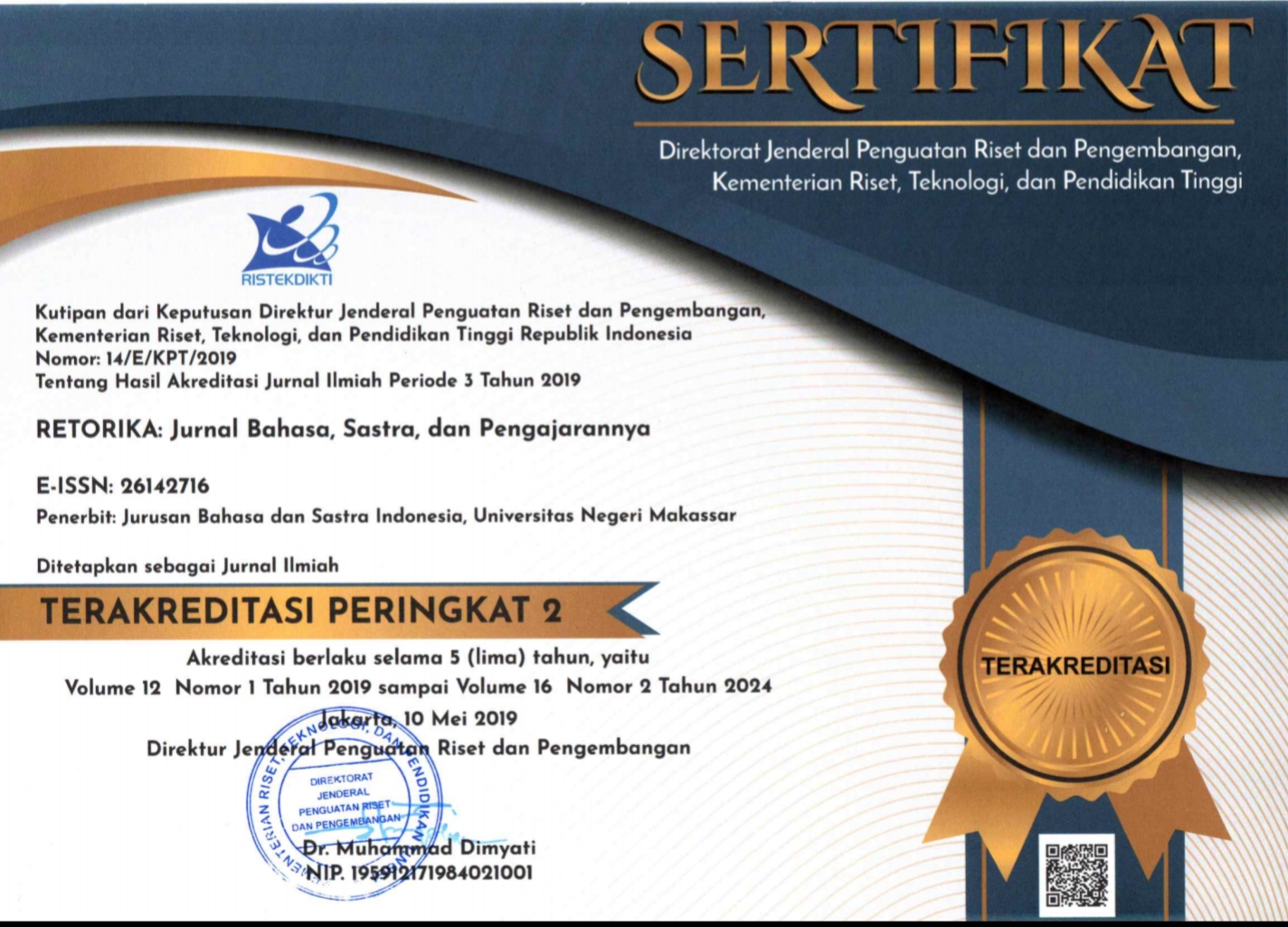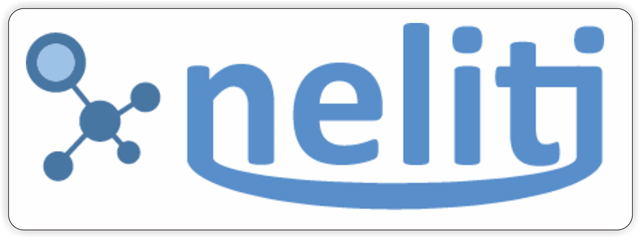AN ANALYSIS OF EXPRESSIVE SPEECH ACTS IN ONLINE DISCUSSION THROUGH WHATSAPP GROUP
(1) Universitas Negeri Makassar
(2) Universitas Bosowa
(3) Universitas Bosowa
(*) Corresponding Author
DOI: https://doi.org/10.26858/retorika.v17i1.52814
Abstract
Keywords
Full Text:
PDFReferences
Abdel-Raheem, Ahmed. (2023). Do Political Cartoons and Illustrations Have Their Own Specialized Forms for Warnings, Threats, and the like? Speech Acts in the Nonverbal Mode. Social Semiotics 33(1):64–97. doi: 10.1080/10350330.2020.1777641.
Argyris, Young Anna, Kafui Monu, Yongsuk Kim, Yilu Zhou, Zuhui Wang, & Zhaozheng Yin. (2021). Using Speech Acts to Elicit Positive Emotions for Complainants on Social Media. Journal of Interactive Marketing 55:67–80. doi: 10.1016/j.intmar.2021.02.001.
Carr, Caleb T., David B. Schrock, & Patricia Dauterman. (2012). Speech Acts Within Facebook Status Messages. Journal of Language and Social Psychology 31(2):176–96. doi: 10.1177/0261927X12438535.
Carretero, M., Maíz-Arévalo, C., & Martínez, M. Á. (2014). Hope This Helps!” An Analysis of Expressive Speech Acts in Online Task-Oriented Interaction by University Students. Yearbook of Corpus Linguistics and Pragmatics 2014: New Empirical and Theoretical Paradigms.
Carretero, Marta, Carmen Maíz-Arévalo, & M. Ángeles Martínez. (2015). An Analysis of Expressive Speech Acts in Online Task-Oriented Interaction by University Students. Procedia-Social and Behavioral Sciences 173:186–90. doi: 10.1016/j.sbspro.2015.02.051.
Chaka, C. (2020). Online Polylogues and the Speech Acts of Online Discussion Forums. Journal of Educators Online 17(2):128.
Creswell, J. W., & Creswell, J. D. (2017). Research Design: Qualitative, Quantitative, and Mixed Methods Approaches. Sage Publications.
Grundlingh, L. (2018). Memes As Speech Acts. Social Semiotics 28(2):147–68. doi: 10.1080/10350330.2017.1303020.
Guiraud, N., Longin, D., Lorini, E., Pesty, S., & Rivière, J. (2011). The Face of Emotions: A Logical Formalization of Expressive Speech Acts. In K. P. Tumer, L. Yolum, L. Sonenberg & P. Stone (Eds.). in Proceedings of the 10th International Conference on Au, SC: International Foundation for Autonomous Agents and Multiagent Systems.ternational Foundation for Autonomous Agents and Multiagent Systems.
Hartinah, Yulmi, Abdul Syukur Ibrahim, & Gatut Susanto. (2021). Tindak Tutur Ekspresif Dalam Debat Calon Pemimpin Bangsa Indonesia Tahun 2019.” Jurnal Pendidikan: Teori, Penelitian, dan Pengembangan 6(3):434. doi: 10.17977/jptpp.v6i3.14627.
Hess, L. (2018). Perspectival Expressives. Journal of Pragmatics 129:13–33. doi: https://doi.org/10.1016/j.pragma.2018.02.007.
Ibrahim, Nini, & Ummul Qura. (2021). Speech Acts used by a Gaming Youtuber in an Online Game Video. RETORIKA: Jurnal Bahasa, Sastra dan Pengajarannya 14(2):125–33. doi: 10.26858/retorika.v14i2.18891.
John, Peter, Benjamin Brooks, & Ulf Schriever. (2019). Speech Acts in Professional Maritime Discourse: A Pragmatic Risk Analysis of Bridge Team Communication Directives and Commissives in Full-Mission Simulation. Journal of Pragmatics 140:12–21. doi: 10.1016/j.pragma.2018.11.013.
Lang, J. M. (2017). Small Changes in Teaching: The First 5 Minutes of Class. The Teaching Center.
Ludwig, Stephan, & Ko de Ruyter. (2016). Decoding Social Media Speak: Developing a Speech Act Theory Research Agenda. Journal of Consumer Marketing 33(2):124–34. doi: 10.1108/JCM-04-2015-1405.
Maiz, Carmen. (2017). Expressive Speech Acts in Educational E-Chats El Uso de Actos Expresivos En Chats Educacionales. Pragmática Sociocultural/Sociocultural Pragmatics 5(2):151–78. doi: https://doi.org/10.1515/soprag-2017-0016.
Mavridis, Nikolaos. (2015). A Review of Verbal and Non-Verbal Human-Robot Interactive Communication.” Robotics and Autonomous Systems 63(P1):22–35. doi: 10.1016/j.robot.2014.09.031.
Meidini, Ayu, Didi Suhendi, & Izzah Izzah. (2023). Directive Speech Acts of Teacher and Students in Online Teaching Learning Interactions at SMP Ignatius Global School Palembang. Journal of Social, Humanity, and Education 3(2):147–55. doi: 10.35912/jshe.v3i2.1321.
Mills, Geoffrey E & Gay, L. R. (2019). Educational Research: Competencies for Analysis and Applications, 12th Edition.
Morales-Ramirez, I., Fitsum Meshesha Kifetew, & Anna Perini. (2019). Speech-Acts Based Analysis for Requirements Discovery from Online Discussions. Information Systems 86:94–112. doi: 10.1016/j.is.2018.08.003.
Morales-Ramirez, Itzel, & Anna Perini. (2014). Discovering Speech Acts in Online Discussions: A Tool-Supported Method. Pp. 137–44 in In CAiSE (Forum/Doctoral Consortium).
Nasser, Marwa Adel. (2022). A Corpus-Based Study of Reviewers’ Usage of Speech Acts. Cogent Arts and Humanities 9(1). doi: 10.1080/23311983.2022.2125155.
Norman K. Denzin, Yvonna S. & Lincol. (2018). The SAGE Handbook of Qualitative Research. California, United States of America: SAGE Publications, Inc. All.
Nurhikmah H, Abdul Saman, Pattaufi, Sujarwo, & Sella Mawarni. 2023. Blended Learning and Computers Self-Efficacy Towards Students Learning Outcomes.” Pp. 106–14 in Proceedings of the Unima International Conference on Social Sciences and Humanities (UNICSSH 2022). Vol. 1. Atlantis Press SARL.
Ogiermann, Eva, and Spyridoula Bella. (2021). On the Dual Role of Expressive Speech Acts: Relational Work on Signs Announcing Closures during the Covid-19 Pandemic. Journal of Pragmatics 184:1–17. doi: 10.1016/j.pragma.2021.07.020.
Riana, A., Tambunan, S., & Sitinjak, V. N. (2018). Expressive Speech Acts in Ellen Show An Interview with Ed Sheeran. 8(4):138–144. doi: https://doi.org/10.30845/ijhss.v8n4p20.
Riemer, N., & Foolen, A. (017). Expressives. 15123. https://doi.org/10.4324/9781315685533.ch27.
Sasabone, L., S. Limbong, F. & Pongpalilu. (2022). Utilizing WhatsApp As An Educational Technology Tool In Improving Students’ Speaking For ESP Instruction. Education, Language, and Culture (EDULEC) 2(2):170–79. doi: DOI: https://doi.org/10.56314/edulec.v2i2.
Searle, J. R. (1979). Expression and Meaning: Studies in the Theory of Speech Acts. Cambridge University Press.
Searle, John. (2014). What Is a Speech Act?. Philosophy in America 221–39.
Shleykina, G. (2019). The Interlanguage Pragmatics of Greetings.Beyond Words 7(1):43–60.
Sujarwo, Muhammad, Ananda Astrini, Sahraeny, Sitti, & Hasnani Amir, Herawaty abbas. (2022). Representative of Hedonism Ideology in a Novel of the Great Gatsby by F . Scott Fitzgerald. International Journal of Education and Humanities (IJOLEH) 1(1):27–34. doi: DOI: https://doi.org/10.56314/ijoleh.v1i1.37.
Sujarwo, S., Sukmawati, S., Asdar, A., Siradjuddin, S., & Ariani, N. (2020). University Students’ Perception on the Verbal Interaction through WhatsApp Chat Group.” Al-Ta Lim Journal 27(3):250–57. doi: 10.15548/jt.v27i3.633.
Sujarwo, Sukmawati, Akhiruddin, Ridwan, & Suharti Siradjuddin. (2020). An Analysis of University Students’ Perspective On Online Learning in The Midst of Covid-19 Pandemic. Jurnal Pendidikan Dan Pengajaran 53(2):125. https://doi.org/10.23887/jpp.v53i2.24964.
Suyitno, Imam, Wevi Lutfitasari, & Heni Dwi Arista. (2021). Teachers Speech to Stimulate Students in Learning Interaction. RETORIKA: Jurnal Bahasa, Sastra Dan Pengajarannya 14(1):69–8. doi: 10.26858/retorika.v14i1.19055.
Tursunovich, Rustamov Ilkhom. (2022). The Significance of Pragmatic Appropriateness in Esl Culture. Pp. 157–60 in Proceedings of International Scientific Conference on Multidisciplinary Studies Hosted online from Moscow, Russia.
Wahana, Desi, M. R. Nababan, & Riyadi Santosa. (2019). Translation Techniques of Expressive Speech Acts on Anger Speech Events in Flawless. International Jounrnal of Linguistic, Literature, and Translation (IJLLT) 2(5):118–31. doi: 10.32996/ijllt.2019.2.5.14.
Yu, Carol, Dennis Tay, Ying Jin, & Xinhua Yuan. (2023). Speech Acts and the Communicative Functions of Emojis in LIHKG Online Discussion Forum amid COVID-19. Frontiers in Psychology 14(July):1–14. doi: 10.3389/fpsyg.2023.1207302.
Article Metrics
Abstract view : 236 times | PDF view : 72 timesRefbacks
- There are currently no refbacks.
Copyright (c) 2024 Asia M Asia M, Asdar Asdar, Nursamsilis Lutfin

This work is licensed under a Creative Commons Attribution-NonCommercial 4.0 International License.
Published by:
Department of Indonesian Language, Faculty of Languages and Literature, Universitas Negeri Makassar in cooperate with Asosiasi Dosen Bahasa dan Sastra Indonesia (ADOBSI) and Ikatan Program Studi Pendidikan Bahasa dan Sastra Indonesia (IKAPROBSI).
Address: Department of Indonesian Language Office, DG Building Second Floor, UNM Parangtambung, Daeng Tata Raya Street, Makassar, South Sulawesi, Indonesia
 Email: retorika@unm.ac.id
Email: retorika@unm.ac.id

RETORIKA: Jurnal Bahasa, Sastra,dan Pengajarannya is licensed under a Creative Commons Attribution-NonCommercial 4.0 International License.
















